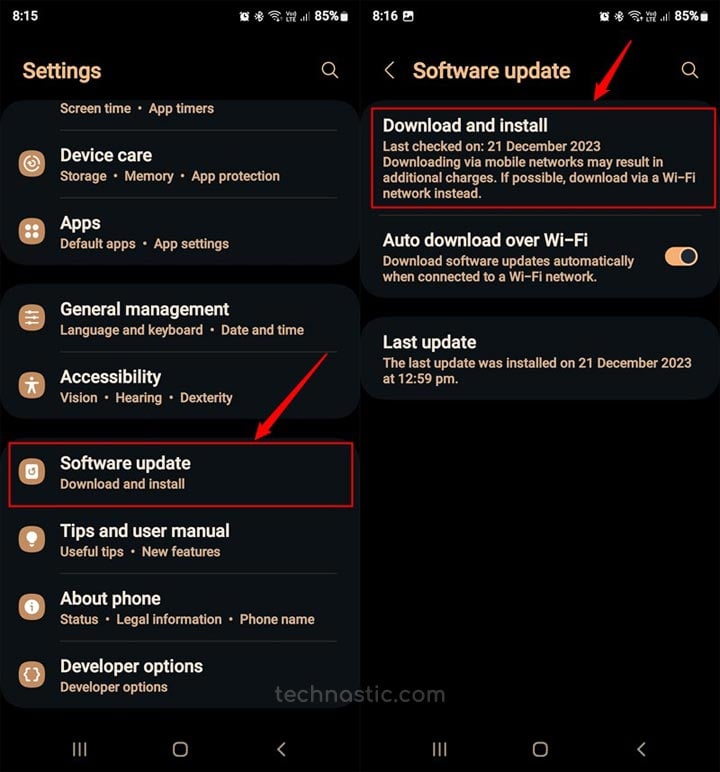- Update the app
- Clear app cache and data
- Restart your device
- Uninstall and re-install the app
- Free up your device storage
App crashes are a common issue on Android. Insufficient storage, low RAM, CPU overload, device overheating, and temporary glitches might force an app to stop abruptly. If apps keep closing, stopping, or crashing automatically on your Android device, we’ve 15 tips to fix the problem.
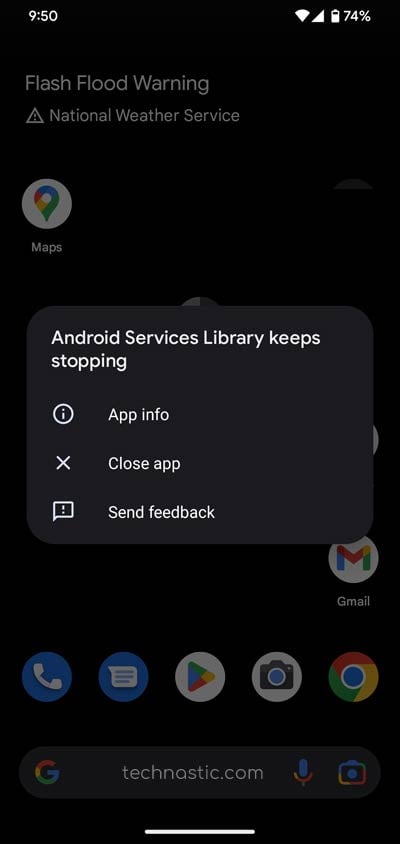
1. Check Your Internet Connection
Almost all apps and games require a network connection to communicate with the server and load data. If an Android app or game fails to do this, it may show a blank screen and even freeze and stop.
To resolve this problem, ensure a stable mobile data or Wi-Fi connection.
2. Restart Your Phone
Restarting an Android device is equivalent to performing a soft reset. It may seem like a simple solution, but restarting your phone clears temporary glitches or background processes that may cause the apps to close.
Don’t Miss: List of 90+ Google Easter Eggs You Should Try
3. Close All Apps and Restart the Crashing App
If you have too many apps running in the background, it may affect the efficiency of your phone’s RAM. Low RAM can disrupt apps from working properly. To close all apps and restart the crashing app on your Android phone:
- Tap the Recents button on your phone’s navigation bar.
- Now tap the Close All button to close all apps.
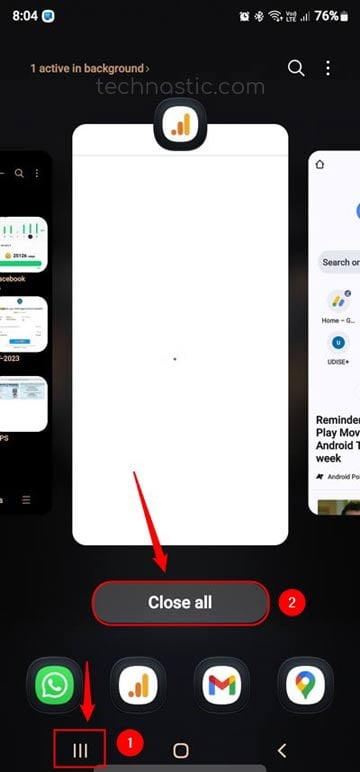
- When all apps are closed, open the app that was crashing. It should now run smoothly.
4. Enable RAM Plus
If closing all open apps doesn’t help, try enabling the RAM Plus feature.
- Open Settings and navigate to Device Care.
- On the Device Care page, tap Memory.
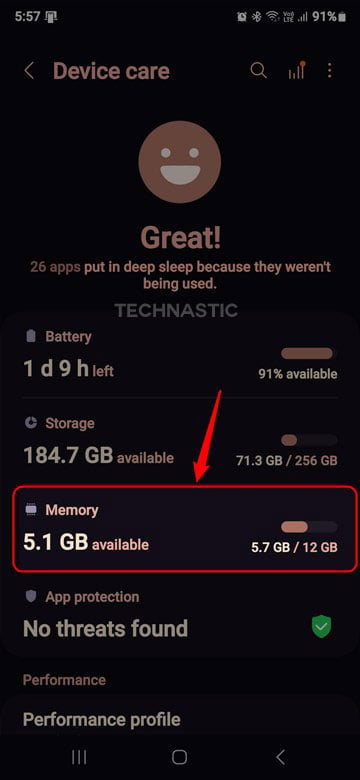
- On the next screen, select RAM Plus and tap the slider next to it.
- Select the amount of RAM you want to allocate to the virtual RAM and tap OK.
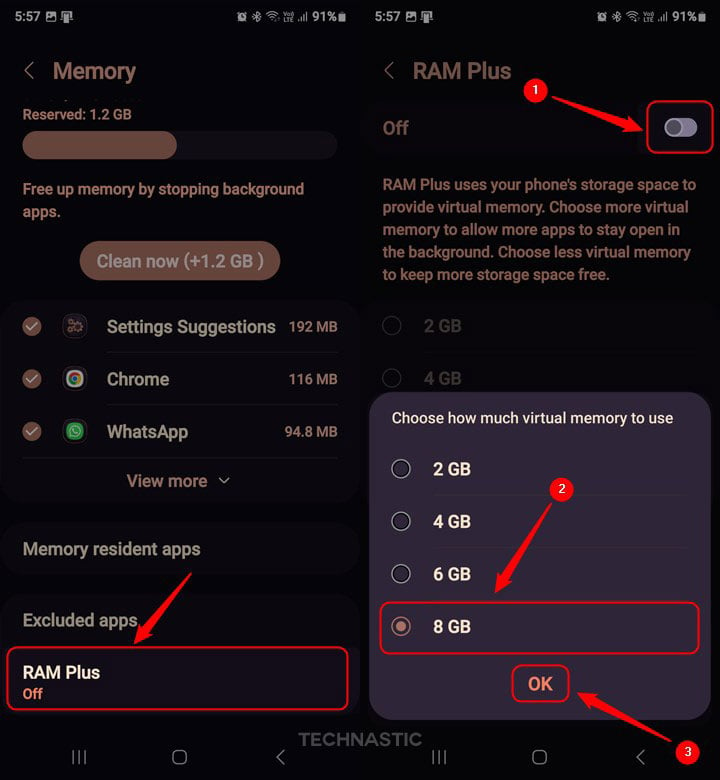
5. Force Stop the App
One of the solutions to stop an Android app from closing abruptly is to stop it forcibly and restart it. To do so, hold the app icon in question and select App info.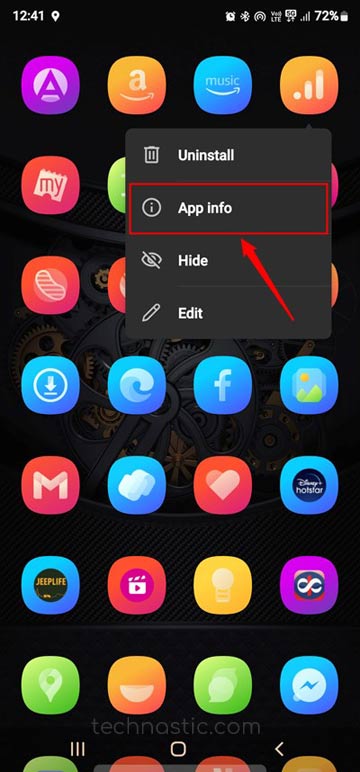
Tap on the Force stop option on the next screen.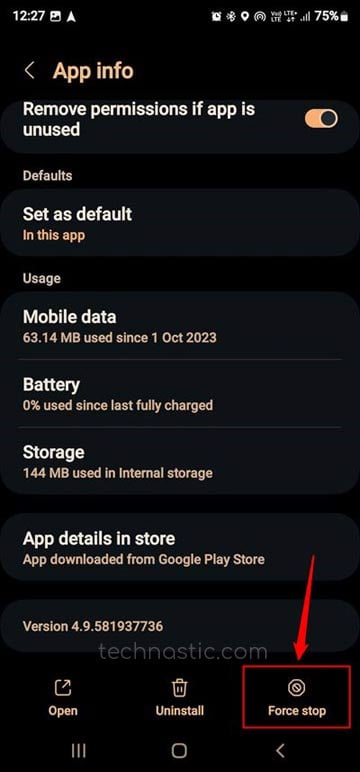
You can also access the App info page by navigating to Settings > Apps and selecting the app you want to stop temporarily.
You can reopen the app to check if it still closes or crashes.
6. Reset App Preferences
Resetting app preferences is another method that can help fix issues like apps randomly closing or crashing. Doing so will not delete any data or apps, but will reset all app preferences to their default values. The process resets the preferences for disabled apps, default apps, background data, notifications, and permission restrictions for all installed apps on your device.
To reset app preferences:
1. Go to your device’s Settings.
2. Scroll down and tap on Apps or Applications.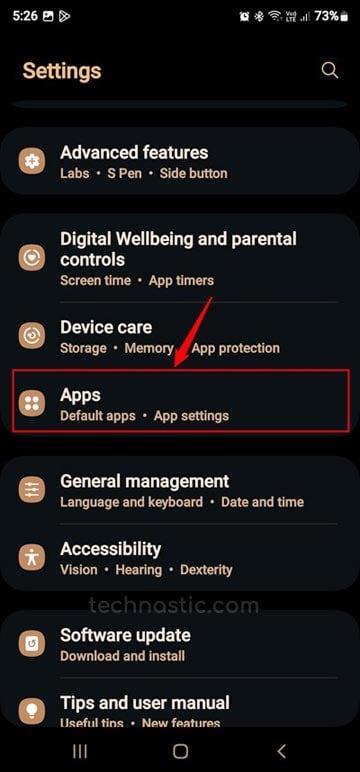 3. Tap the 3-dot icon in the top right corner and select Reset App Preferences.
3. Tap the 3-dot icon in the top right corner and select Reset App Preferences.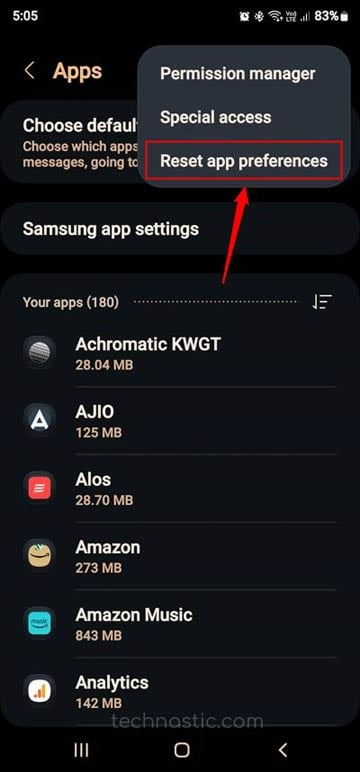 4. Select Reset when prompted.
4. Select Reset when prompted.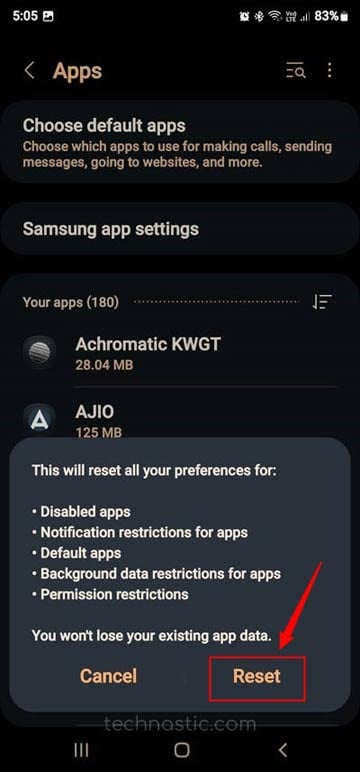
7. Clear App Cache and Data
App cache and data are temporary files stored on your device to help apps run faster. However, these files can build up over time and cause issues such as app crashes. Clearing the app cache and data on Android can help resolve such issues.
- Open Settings on your Android device.
- Go to Apps, Applications, or Application Manager, depending on your device model.
- Select the app that is constantly closing.
- Tap on Storage.
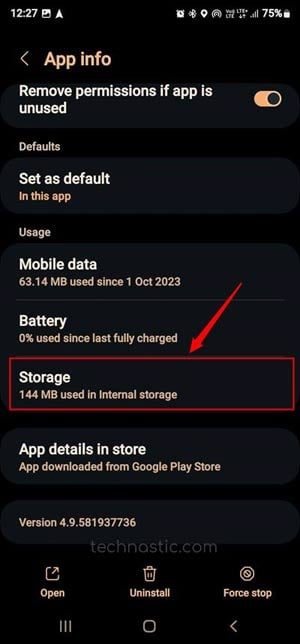
- You will see options to clear the app’s cache or data here.
- Tap Clear cache first, then try using the app again.
- If the issue persists, tap on Clear data (this will reset the app to its default settings).
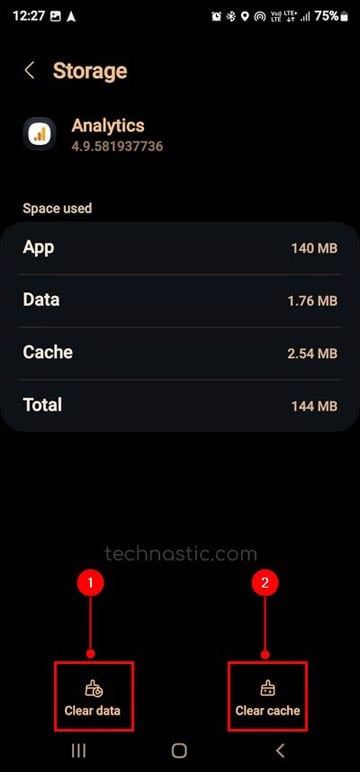
Repeat this process for any other apps that are constantly closing.
Read Also: 125+ Funny Websites to Cure Boredom Online
8. Update the Crashing App
Updating the app is an important step in resolving the issue of apps constantly closing on your Android device. An outdated app can have compatibility issues with your current version of Android.
- Open the Google Play Store on your Android device.
- Tap your Google account profile picture in the top-right corner to open the menu.
- Select the Manage apps and device option.
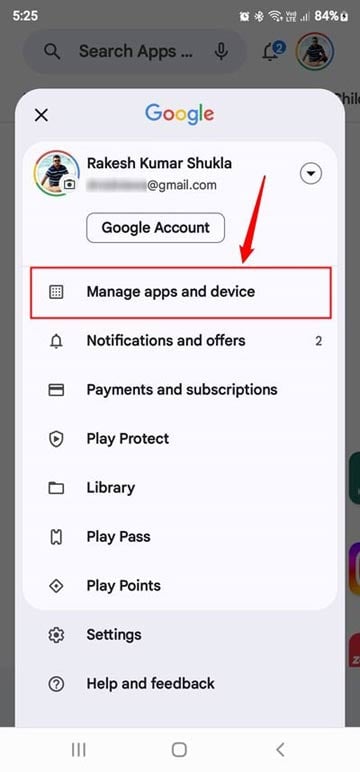
- If any updates are available, tap the Update all option.
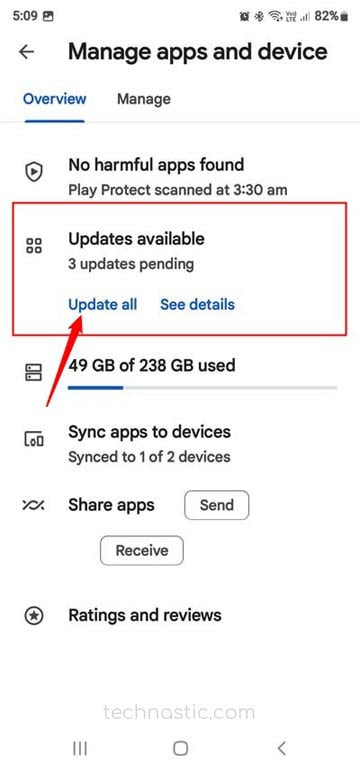
- Alternatively, you can also search for the app to update using the Play Store search feature. Select the app and tap on the Update button.
9. Check for App Permissions
Sometimes, apps may not function properly if they don’t have all the necessary permissions. To check and grant app permissions, follow these steps:
- Open Settings on your Android device.
- Go to Apps or Application Manager, depending on your device model.
- Select the app that is constantly closing.
- Tap on Permissions.
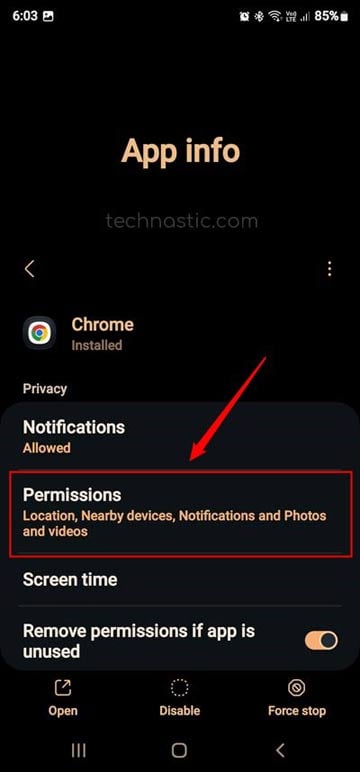
- Here, you will see a list of permissions the app has requested.
- Make sure all necessary permissions are turned on.
Note: Be cautious when granting permissions to apps and only allow the necessary ones for the app’s proper functioning.
10. Uninstall and Reinstall the Problematic App
Uninstalling and reinstalling an app is a common troubleshooting step to fix app-related issues on Android. Please note that uninstalling an app will delete all its data, including settings, preferences, and login information.
Uninstall the App
To uninstall an app from your Android device:
- Go to your device’s Settings.
- Scroll down and tap on Apps or Applications.
- Here you will see a list of all the apps installed on your device. Find the app that keeps closing and tap on it.
- On the next screen, tap on Uninstall.
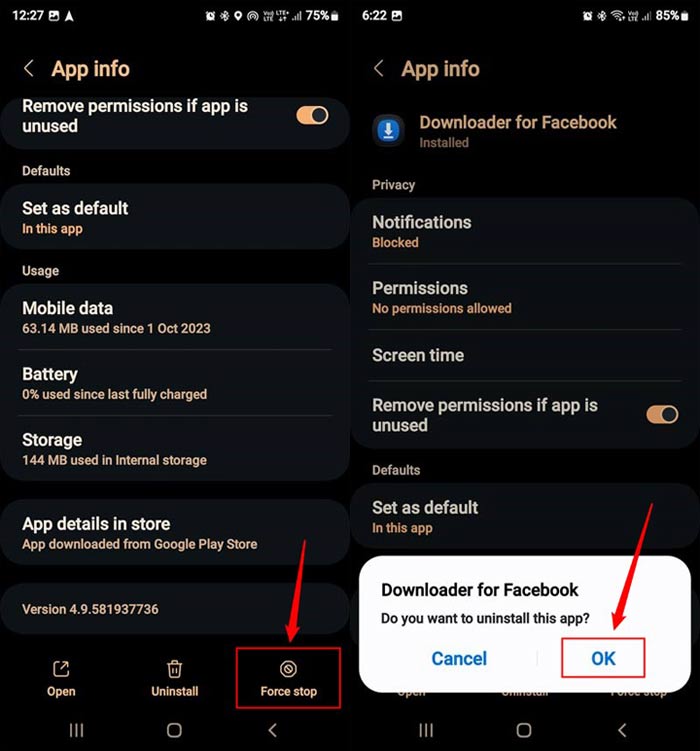
- A prompt will appear asking if you want to delete the app. Select Yes.
Alternatively, you can uninstall an app directly from your home screen or app drawer by long-pressing its icon and selecting Uninstall from the options that appear.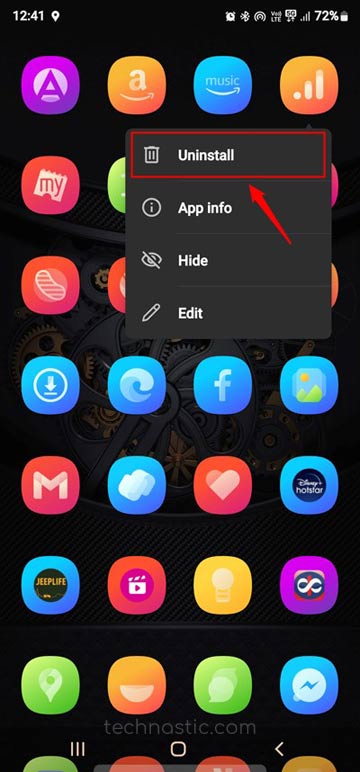
Reinstall the App
To reinstall the app:
- Open the Google Play Store on your device.
- Search for the app that you uninstalled.
- Once you find it, tap the Install button next to the app name.
- Wait for the app to finish installing and then select Open.
If the app that keeps stopping on your device is a system app, you may be unable to uninstall or reinstall it. In that case, you should:
- Go to Settings > Apps.
- Select the app from the list.
- On the App info page, tap the 3-dot icon on the top right corner of the screen and select the Uninstall updates option.
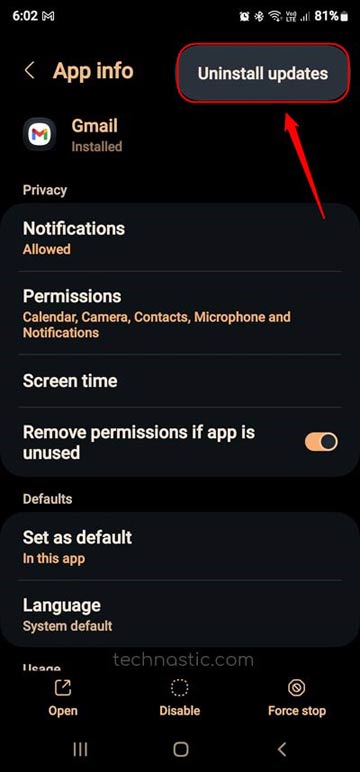
11. Check for Available Storage on Your Device
Insufficient storage space on your device can also force apps to close unexpectedly. Apps require a certain amount of storage space to function properly. Therefore, it is important to regularly check for available storage space on your Android device to avoid such problems.
Here are some steps you can follow to check the available storage space on your Android device:
If you are a Samsung user, go to Settings > Device Care > Storage. You can free up lots of space by uninstalling unused apps, clearing the Recycle bin, and deleting duplicate and very large files.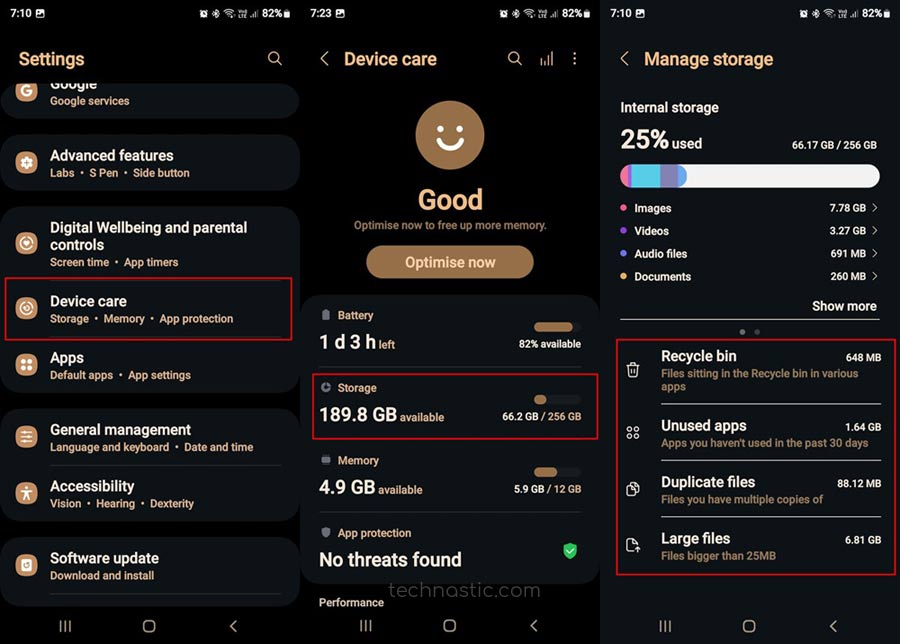
On other Android phones or tablets, go to Settings and search for “storage” or “storage and memory“. This will open up a page where you can view details about how much storage space is being used and how much is available.
You can also free up some RAM by optimizing your phone’s memory through storage management.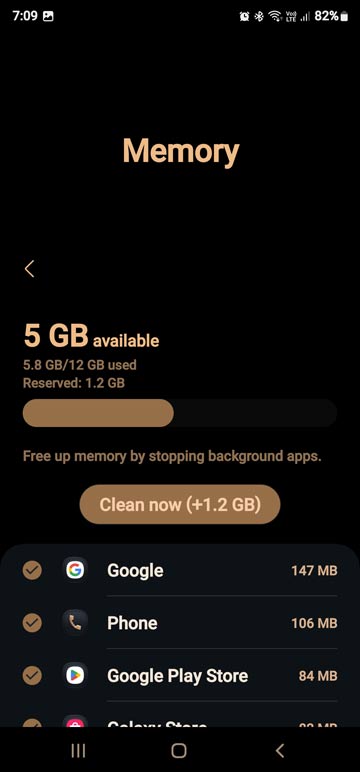
12. Adjust Background Process Limit Settings
Several apps and processes run in the background while you use other apps or your device’s screen is turned off. Too many processes may cause performance issues and lead to unexpected app crashes.
To fix this issue, adjust the background process limit settings.
- Go to Settings and enable the Developer options on your Android device.
- Open the Developer options.
- Under the Apps section in Developer options, you’ll find an option called Background process limit.
- Tap it to open a menu that will allow you to adjust this setting.
- Set the background process to Standard Limit.
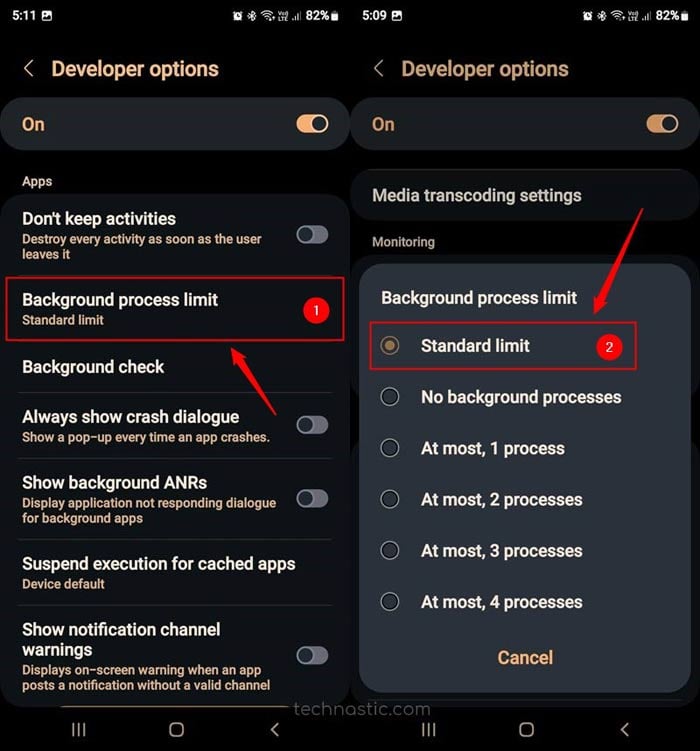
- Restart your device to ensure that the new settings take effect.
After your device has restarted, try using the app that previously closed unexpectedly.
13. Reboot Your Device into Safe Mode
Safe Mode can help determine if a third-party app is causing the problem. It temporarily disables all third-party apps and only allows system apps to run. If the app functions properly in safe mode, identify the app causing the issue. You can do this by uninstalling recently downloaded apps one by one until the issue is resolved.
There are 4 ways you can boot Android devices into Safe Mode.
- Press and hold down the Power button.
- Tap and hold Power off until you see the option to reboot into safe mode.
- Tap OK or Safe Mode and wait for your device to restart.
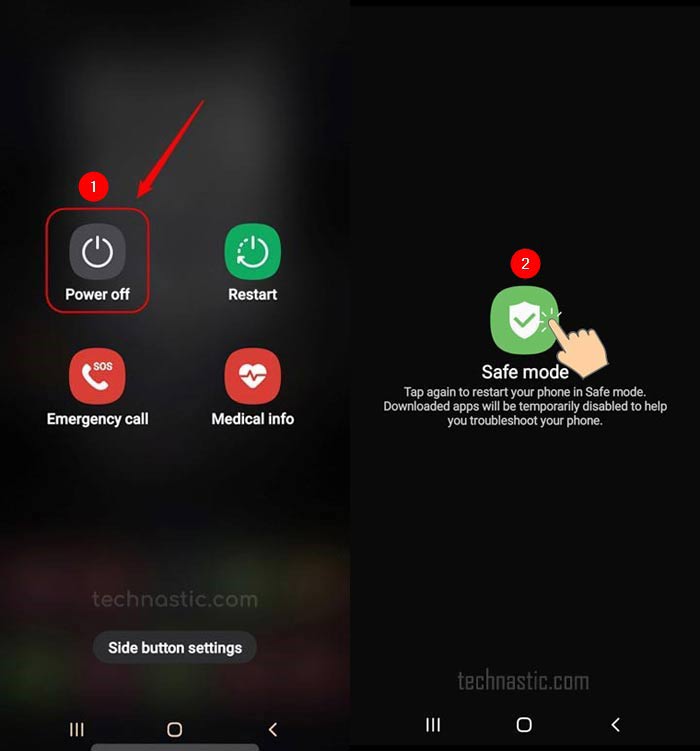
- Once in Safe Mode, try using the affected app(s) to see if they still keep closing.
14. Update Your Device’s Software
OEMs and app developers regularly release updates to address bugs and improve performance, so keeping your device up-to-date can prevent apps from closing randomly.
To check for and install OS updates:
1. Go to your device’s Settings.
2. Scroll down and tap on System or About Phone.
3. Look for an option like Software update, System update, or Check for update. The exact name may vary depending on your device manufacturer.
4. Tap this option and follow any prompts to install available updates.
If updates are unavailable, try checking again after a few days, as new updates may become available at different times for different devices.
15. Perform a Factory Reset
If none of the above solutions work, performing a factory reset is your last resort. This will erase all data and settings from your device and restore it to its original state. It is recommended that you back up all important data before performing a factory reset.
1. Open Settings on your Android device.
2. Go to System or General Management or Advanced, or Additional settings, depending on your device model.
3. Select Reset or Backup & Reset.
4. Choose the option for Factory Data Reset.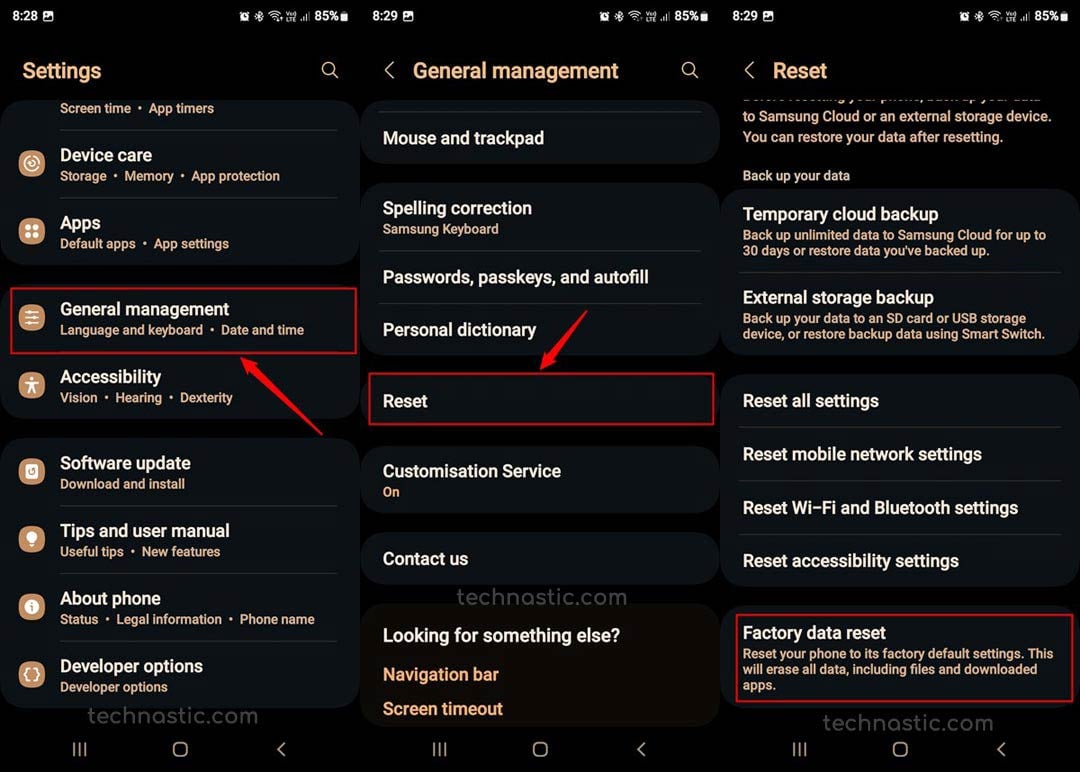
5. Confirm the action and wait for the process to complete.
Alternatively, you can perform a hard reset on your Android device via the Recovery Mode.
If the app still doesn’t work as expected, your best bet is to contact the developer and report the issue. Meanwhile, consider using an alternative app offering similar features and functions. This can help you continue using essential services while waiting for a fix from the app developer.
